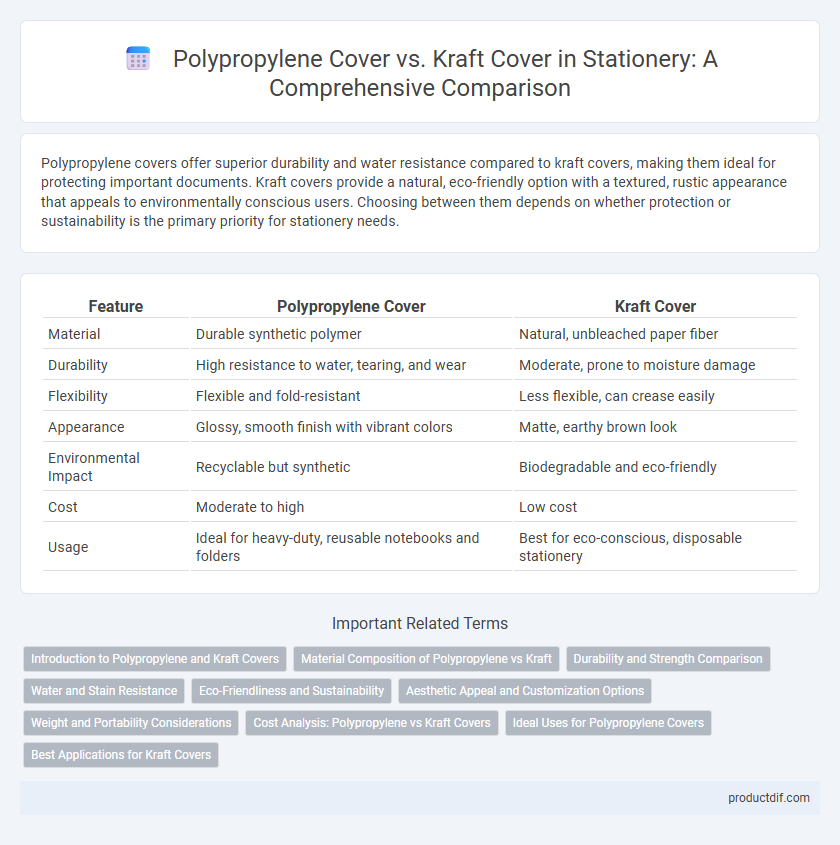Polypropylene covers offer superior durability and water resistance compared to kraft covers, making them ideal for protecting important documents. Kraft covers provide a natural, eco-friendly option with a textured, rustic appearance that appeals to environmentally conscious users. Choosing between them depends on whether protection or sustainability is the primary priority for stationery needs.
Table of Comparison
| Feature | Polypropylene Cover | Kraft Cover |
|---|---|---|
| Material | Durable synthetic polymer | Natural, unbleached paper fiber |
| Durability | High resistance to water, tearing, and wear | Moderate, prone to moisture damage |
| Flexibility | Flexible and fold-resistant | Less flexible, can crease easily |
| Appearance | Glossy, smooth finish with vibrant colors | Matte, earthy brown look |
| Environmental Impact | Recyclable but synthetic | Biodegradable and eco-friendly |
| Cost | Moderate to high | Low cost |
| Usage | Ideal for heavy-duty, reusable notebooks and folders | Best for eco-conscious, disposable stationery |
Introduction to Polypropylene and Kraft Covers
Polypropylene covers are durable, water-resistant, and flexible, making them ideal for protecting documents in notebooks, folders, and binders. Kraft covers feature a natural, eco-friendly texture, often made from recycled paper, providing a sturdy and biodegradable option for stationery. Both materials offer distinct benefits tailored to different preferences for durability and environmental impact in stationery products.
Material Composition of Polypropylene vs Kraft
Polypropylene covers are made from a synthetic polymer derived from propylene monomers, offering high durability, water resistance, and flexibility, making them ideal for protecting documents. Kraft covers are composed of natural wood pulp fibers, providing an eco-friendly, biodegradable option with a rough texture and moderate strength suitable for everyday use. The material composition of polypropylene ensures longevity and moisture protection, while kraft's organic fibers prioritize sustainability and recyclability in stationery products.
Durability and Strength Comparison
Polypropylene covers offer superior durability and resistance to water, making them ideal for protecting documents in various environments. Kraft covers, known for their eco-friendliness, provide moderate strength but are more prone to wear and tear over time. Polypropylene's synthetic composition results in higher tensile strength compared to the natural fibers of kraft paper, ensuring longer-lasting protection.
Water and Stain Resistance
Polypropylene covers offer superior water and stain resistance compared to kraft covers, making them ideal for protecting documents in humid or messy environments. Polypropylene's synthetic composition prevents moisture absorption and resists ink or liquid stains, ensuring long-lasting durability. Kraft covers, made from natural fibers, are more prone to water damage and staining, making them less suitable for safeguarding important paperwork.
Eco-Friendliness and Sustainability
Polypropylene covers offer durability and water resistance but are less biodegradable compared to Kraft covers, which are made from natural fibers and decompose more easily, enhancing sustainability. Kraft covers are derived from renewable resources and often feature recycled content, significantly reducing environmental impact. Choosing Kraft covers supports eco-friendly stationery by minimizing plastic waste and promoting compostability in product packaging.
Aesthetic Appeal and Customization Options
Polypropylene covers offer a sleek, glossy finish and vibrant color options that enhance the aesthetic appeal of notebooks, making them ideal for modern, eye-catching designs. Kraft covers provide a natural, rustic look with an earthy tone, appealing to eco-conscious users and brands seeking a vintage or handmade style. Customization options for polypropylene include full-color printing and embossing, while kraft covers excel in stamped logos and handwritten or minimalist designs.
Weight and Portability Considerations
Polypropylene covers are lightweight and water-resistant, making them ideal for portable use and frequent handling in various environments. Kraft covers tend to be heavier and more rigid, providing durability but reducing ease of transport. For those prioritizing portability and minimal weight, polypropylene covers offer a practical advantage over kraft covers.
Cost Analysis: Polypropylene vs Kraft Covers
Polypropylene covers typically cost more than Kraft covers due to their synthetic composition and enhanced durability. Kraft covers offer a more economical option with biodegradable and recycled paper materials, making them suitable for budget-conscious and eco-friendly consumers. When analyzing stationery expenses, choosing Kraft covers reduces upfront costs, whereas polypropylene covers provide longer-term value by resisting wear and moisture.
Ideal Uses for Polypropylene Covers
Polypropylene covers are ideal for stationery items requiring durability and water resistance, such as presentation folders, report covers, and document protectors. Their smooth, glossy finish enhances the professional appearance of office materials while safeguarding against spills and wear. Unlike kraft covers, polypropylene offers superior flexibility and longevity, making it perfect for frequently handled documents.
Best Applications for Kraft Covers
Kraft covers offer superior durability and natural texture, making them ideal for eco-friendly notebooks, journals, and sketchbooks aimed at sustainability-conscious consumers. These covers excel in applications requiring a rustic or vintage aesthetic, commonly used in handmade or artisanal stationery products. Their strong, recyclable material is perfect for packaging, report covers, and promotional stationery that prioritize environmental responsibility.
Polypropylene Cover vs Kraft Cover Infographic

 productdif.com
productdif.com